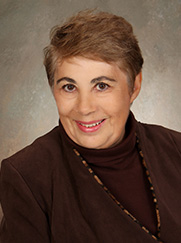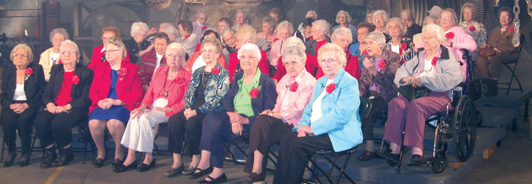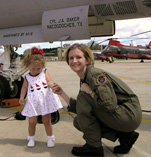Behind a National Movement
Inspired by her mother’s service, Anne Montague seeks to properly recognize unsung WWII heroes
Story by Nate Haas (MS-04)
 “ ‘Had it not been for women, we might very well have lost World War II,’ ” an Iwo Jima survivor once flatly told Anne Montague (MA-82) (right). “And they, and a fascinating piece of history, have basically been ignored.”
“ ‘Had it not been for women, we might very well have lost World War II,’ ” an Iwo Jima survivor once flatly told Anne Montague (MA-82) (right). “And they, and a fascinating piece of history, have basically been ignored.”
Montague is out to change that.
Through her West Virginia-based nonprofit, she’s captured some of the stories of the estimated 6 million women referred to collectively as “Rosie the Riveter.” They served important roles on the home front doing “men’s work” needed for the war effort from 1941-45.
With a group of surviving West Virginia “Rosies,” as Montague calls them, she produced a documentary film, titled We Pull Together: Rosie the Riveters Then and Now, about their time during the war and being pioneers in the workforce. Montague and the women also designed and raised funds for Rosie the Riveter Park (photos below), which opened in May in the Charleston, W.Va., suburb of St. Albans.
She hopes the projects will serve as examples for other communities to locate and collaborate with Rosies on meaningful projects of their choice — be it making quilts, hosting classroom presentations or designing monuments.
Time is of the essence, though. Montague notes that the minimum age of the veterans is 85, and the process can be time consuming. For two years, Montague attempted to track down Rosies and found only one. She caught a break when the Charleston Gazette published a full-page color ad seeking Rosies to tell their stories. The ad ran on March 29, 2009 — a date etched into Montague’s memory.
“They put my mom’s picture in the ad,” she says. Jessie Jacobs, a Rosie herself, worked in an optics factory that created such items as periscopes for ships. “She died at age 63 without my asking what she had done exactly.”
That inspired Montague to start the project.
“I started crying when I saw the ad. She became a pin-up for the project.”
That ad eventually helped Montague identify and interview 170 Rosies in her home state — some of whom were later interviewed by the Today show for an upcoming feature scheduled to air Dec. 7 (Pearl Harbor Day). The interviews have been illuminating. One of the Rosies told Montague that for months she didn’t see sunlight for six days a week while inspecting airplane parts in Cincinnati. She arrived before sunup and left at sundown with only a half day off on Sunday before returning to her job.
“It was really important for them to do the best job they could do. What they were doing was saving lives,” Montague says.
Montague has coordinated events with the Rosies and veterans who served overseas. Often the men will open up and say, “you know, I never really thought about where the airplane came from,” before expressing their gratitude.
“It feels like everything I’ve done in my life has been leading up to do this,” says Montague, who went on from UNC to work for ABC TV in Denver and earn a master’s degree at Harvard before becoming a market research consultant. “These women are part of the fuller story of World War II, and they pioneered the women’s movement a generation later. They taught their daughters to be independent and get an education. Now they are showing what 90-year-old women can do with good support and guidance.” NV
For more information, visit Montague’s nonprofit at www.thanksplainandsimple.org
Photos: 1-3) Grand opening of Rosie Mark, May 26, 2012; 4-5) Rosie the Riveter Park, St Albans, W. Va.; 6) Rosies in the South Charleston Parade; 7-8) Rosies at the Today show taping; 9) Rosie the Riveter quilt; 10) Buddie Curnutte; 11) Betty Rice; 12) Agnes Smith; 13) Neva Rees; 14) Mazie Mullins; 15) Mary Lou Maroney; 16) Jeraldine Kniceley Bock; 17) Garnet Kozielec; 18) Jessie Jacobs Frazier, Anne's mother; 19) Dot Finn; 20) Darlene Dola Spencer Walker; 21) Edie Lyons; 22) Dot Foster.







